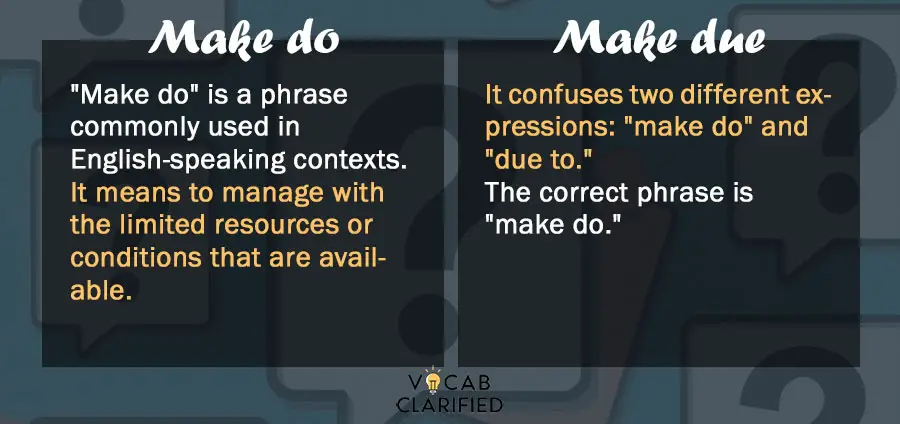If you have found yourself hesitating between “make do” or “make due,” questioning which is grammatically correct or more appropriate for your context, you are not alone.
This common mix-up can lead to confusion and uncertainty. This article will clarify the differences between Make do and Make due by providing a clear guide to their distinct meanings and proper usage.
Understanding “Make Do” And “Make Due”
Make Do: Definition and Usage
“Make do” is a phrase commonly used in English-speaking contexts. It means to manage with the limited resources or conditions that are available. The term implies a sense of improvisation or making the best out of a less-than-ideal situation.
For example:
- With the kitchen under renovation, we had to make do with microwave meals for a week.
- After losing his job, he had to make do with his savings until finding new employment.
Make Due: Definition and Usage
On the other hand, some grammarians consider it a non-standard usage, as it confuses two different expressions: “make do” and “due to.” The correct phrase, as previously defined, is “make do.”
However, “due to” is a separate phrase used to indicate the reason for something.
For instance:
- The game was postponed due to rain.
- Her success was due to hard work and determination.

Side-by-Side Comparison
| Aspect | Make Do | Make Due (Common Misuse) |
| Definition | Manage with available resources | Incorrect mix of terms |
| Common Usage | “We’ll have to make do with this” | Incorrectly used |
| Key Differences | Implies improvisation | Not a standard phrase |
When deciding between “make do” and “make due,” consider the context and the message you wish to convey.
If you are referring to managing or coping with what is available, “make do” is the correct choice.
“Make due,” on the other hand, should generally be avoided as it results from confusing “make do” with “due to.”
Everyday Usage Examples
Let’s see some more examples to illustrate how “make do” fits into everyday language:
- During the blackout, the residents had to make do with candles and flashlights.
- The travelers had to make do with a map after their phone battery died.
Alternative Phrasing Options
While “make do” is the most common expression for managing with limited resources, other options can add variety and nuance to your writing depending on the context:
- Manage with: This emphasizes the act of handling or controlling a situation with what’s available.
- Example: “The team managed with a shoestring budget, utilizing volunteers and donated resources.”
- Cope with: This focuses on dealing with a difficult or challenging situation, often with an emotional element.
- Example: “After the loss of their home, the family bravely coped with living with relatives until they found new housing.”
- Improvise with: This highlights the act of thinking creatively and using available resources in new and unexpected ways.
- Example: “When the recipe called for an ingredient they didn’t have, the chef skillfully improvised with a similar substitute.”
Remember, “make do” remains the most widely recognized and commonly used expression in these situations. However, understanding these alternatives can give you more flexibility and expressiveness in your writing.
FAQ: Make do vs. Make due
“Make do” is an expression meaning to manage or get by with the resources that are currently available, despite them not being ideal. It is often used to describe a situation where someone has to improvise due to limitations.
No, “make due” is a common mistake. The correct phrase is “make do.” People often confuse this with “due to,” which is used to explain the reason something happened.
“Make do” and “make due” sound similar, leading to confusion. However, “make do” is the correct expression for coping with limited resources, while “make due” is incorrectly used in place of “make do” or misinterpreted as “due to.”
The phrase “make do” comes from older forms of English where “do” was used in the sense of “to suffice” or “to be enough.” Over time, “make do” evolved to mean managing with what is available.
Conclusion
Understanding the difference between “make do” and “make due” can help avoid confusion and improve your clarity in communication.
“Make do” is the correct expression when referring to coping with less than ideal conditions, whereas “make due” is often a mix-up of terms. Use this guide as a reference, and soon, you won’t have problems deciding whether to use make do or make due.

